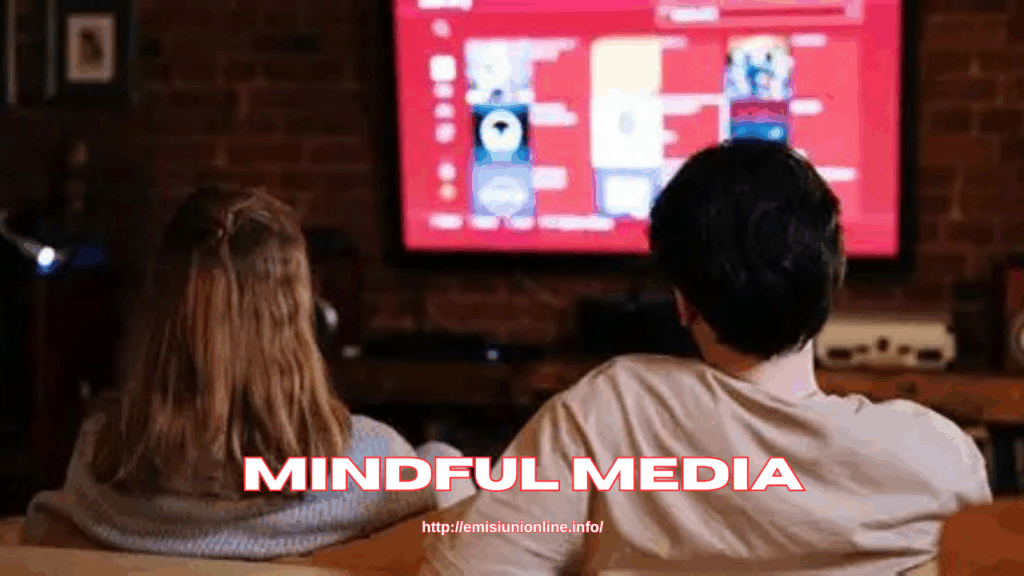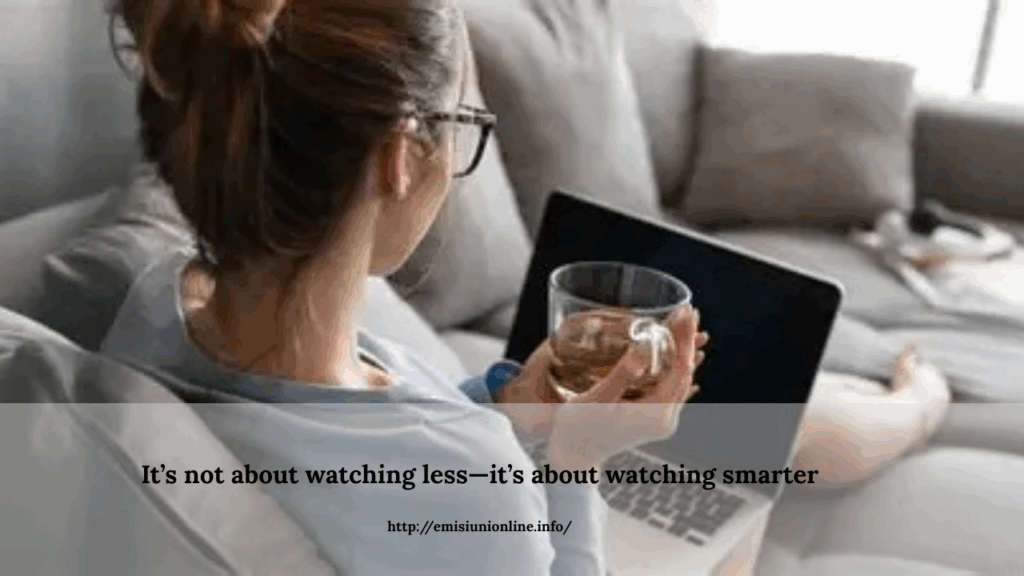The Mindful Viewer: Setting Boundaries for Screen Time and Sanity
posted by: Guest
No Comments »

In a world where screens are always within reach, television often becomes our escape from stress and daily pressures. A comforting show or favorite series can offer relaxation, laughter, and connection. Yet without awareness and boundaries, TV can shift from a source of comfort to a silent disruptor of mental health. At Emisi Union Online, we believe that creating balance through mindful viewing not only protects mental clarity but also supports emotional healing and addiction recovery.
The Hidden Impact of Excessive Screen Time
Television, like many modern conveniences, can become unhealthy when used in excess. Binge-watching may seem harmless, but prolonged screen time often leads to sleep disruption, reduced focus, and emotional fatigue. For individuals in recovery or those managing mental health challenges, these effects can interfere with progress and stability.
Just as overindulgence in substances can cloud judgment and numb emotions, uncontrolled TV use can dull awareness and deepen feelings of isolation. Learning to engage with media mindfully helps restore balance, turning screen time into a supportive part of a healthy lifestyle instead of a setback.
What It Means to Be a Mindful Viewer
Being a mindful viewer is about watching with purpose and awareness. Instead of letting television fill every quiet moment, mindful viewing encourages you to ask: “Why am I watching, and how does this make me feel?”
When approached this way, television becomes a tool for relaxation, not escape. It helps you stay connected to your thoughts and emotions, promoting the same self-awareness that is central to addiction recovery and mental well-being.
Setting Healthy Boundaries for Screen Time
1. Create a Viewing Schedule
Decide in advance when and how long you will watch TV. Setting boundaries prevents mindless binge-watching and ensures you have time for other restorative activities like exercise, reading, or social connection.
2. Choose Content That Supports Your Mental Health
Select shows and movies that inspire, educate, or uplift. Avoid content that triggers negative emotions or stress. Positive storytelling can improve your mood and strengthen resilience, while negative or chaotic programming can add unnecessary anxiety.
3. Watch with Intention
Before pressing play, take a moment to breathe and focus. Remind yourself that you are choosing to relax, not to avoid your feelings or responsibilities. This small act of mindfulness keeps you grounded.
4. Disconnect Before Bedtime
Late-night TV often interferes with sleep and emotional regulation. Turn off screens at least 30 minutes before bedtime and replace them with quiet, calming routines such as prayer, meditation, or journaling.
5. Balance TV with Real-Life Connection
Television can bring people together, but it can also isolate. Watch with friends or family when possible, and discuss what you watch. Shared experiences strengthen emotional bonds and counteract loneliness.
Why Mindful Media Matters in Recovery
For those healing from addiction, learning to set limits is an essential life skill. Boundaries foster discipline, structure, and self-respect—qualities that are just as important when it comes to screen time as they are in recovery.
At Emisi Union Online, we integrate these principles into our holistic, faith-based approach to treatment. Whether through inpatient or outpatient care, our goal is to help individuals build healthy routines that strengthen both body and mind. Mindful media use fits naturally into this process by reinforcing awareness, promoting balance, and supporting emotional wellness.
Reclaim Your Time, Clarity, and Peace
Screens will always be part of modern life, but how we engage with them determines whether they harm or heal. By becoming a mindful viewer, you take control of your habits and protect your mental and emotional health. Each intentional choice you make moves you closer to clarity, balance, and lasting recovery.
If you or someone you care about is struggling with unhealthy habits or addiction, Emisi Union Online is here to help. Our compassionate team offers individualized programs designed to restore peace, strengthen resilience, and guide you toward a healthier, more mindful life.
Reach out today to begin your journey toward recovery, balance, and renewed purpose. Healing starts with awareness—and even small changes, like mindful viewing, can lead to powerful transformation.
TV and Mental Clarity: Why Mindful Watching Matters in the Digital Age
posted by: Guest
No Comments »

In a world where screens surround us from morning to night, television remains one of the most common ways people unwind. For many, it offers comfort and distraction after long days filled with stress, responsibilities, and emotional strain. But when TV watching becomes excessive or unconscious, it can quietly cloud the mind, fuel anxiety, and disrupt recovery progress. At Emisi Union Online, we believe that mindful media habits are essential for maintaining mental clarity and supporting holistic healing in the digital age.
The Digital Overload: How TV Impacts the Mind
Television has changed dramatically over the years. With streaming services, on-demand shows, and constant new content, it is easier than ever to lose track of time and binge-watch for hours. While a single episode might bring relaxation, several hours of nonstop viewing can lead to overstimulation, poor sleep, and emotional fatigue.
This pattern is especially concerning for those in addiction recovery. Just as substances can serve as a temporary escape from reality, so can excessive TV watching. Over time, both can dull awareness and reduce motivation. Without realizing it, the mind shifts from being engaged to being numbed—a state that works against recovery and emotional growth.
What It Means to Watch Mindfully
Mindful watching means being intentional about what you consume, how long you watch, and how it affects your mood and focus. It is not about cutting out TV altogether but rather transforming it into a conscious, healthy activity that promotes relaxation instead of distraction.
When practiced regularly, mindful watching can help you:
- Strengthen self-control and awareness
- Reduce emotional triggers and stress
- Improve focus and clarity
- Create structure and balance in your daily routine
These benefits support the same principles that guide addiction recovery: self-awareness, moderation, and purposeful living.
Practical Steps to Cultivate Mindful Watching
1. Choose Content That Uplifts Your Spirit
Opt for programs that leave you feeling encouraged, informed, or inspired. Avoid shows that trigger negative emotions, unhealthy cravings, or pessimism. The media you consume directly influences your mindset.
2. Set Intentional Limits
Plan your screen time before you start watching. Decide how many episodes or minutes you’ll watch and stick to it. This simple boundary helps prevent binge-watching and supports better sleep and mental clarity.
3. Create a Relaxing Viewing Environment
Make TV time part of a calming routine rather than a mindless habit. Dim the lights, silence your phone, and focus on the experience. Avoid multitasking while watching—this helps you stay present and aware.
4. Reflect After Watching
Take a few moments to think about how the content made you feel. Did it calm your mind or leave you restless? This small reflection builds awareness and helps you make better choices next time.
Why Mindful Watching Matters in Recovery
For individuals healing from addiction or managing mental health challenges, mindful watching is more than a lifestyle choice—it is a form of self-care. It helps you reconnect with intention, prioritize emotional well-being, and develop healthier coping mechanisms.
At Emisi Union Online, we teach clients that recovery involves rebuilding balance across all areas of life. Mindful media use aligns with that mission. It nurtures clarity, encourages rest, and promotes conscious decision-making—the very qualities that strengthen long-term sobriety and mental stability.
Restoring Clarity in a Screen-Filled World
We live in an age where distraction is constant, and attention is easily lost. Learning to watch TV mindfully gives you back control over your time and emotions. It turns entertainment into an opportunity for relaxation and reflection rather than a form of escape.
If you are struggling to find balance in your habits—whether with media, stress, or substance use—Emisi Union Online is here to help. Our compassionate team provides individualized care through inpatient, outpatient, and holistic treatment programs designed to heal the mind, body, and spirit.
Reach out today to begin your journey toward mental clarity, emotional balance, and lasting recovery. Together, we can help you build a healthier, more mindful life—one intentional choice at a time.
Comfort, Not Chaos: How Mindful TV Habits Support Emotional Well-being
posted by: Guest
No Comments »

In today’s fast-paced world, television often becomes our go-to source of comfort at the end of a long day. A familiar show or soothing movie can help us unwind and temporarily escape stress. But when TV watching turns into endless hours of mindless viewing, it can quietly harm our mental and emotional health. At Emisi Union Online, we recognize that healthy habits—even with something as common as TV—play a powerful role in supporting recovery, mental wellness, and a balanced life.
The Emotional Impact of Modern Media
Television can shape how we think, feel, and respond to life. Positive, uplifting content can encourage laughter, connection, and relaxation, while negative or overly stimulating programs can trigger anxiety, loneliness, or irritability.
For individuals in addiction recovery, this distinction matters deeply. Emotional balance is essential to healing, and constant exposure to chaotic or triggering media can disrupt that stability. Developing mindful viewing habits allows you to use TV as a tool for comfort instead of a source of stress.
What Does It Mean to Watch Mindfully?
Mindful watching is the practice of choosing what you watch and how you watch it with intention. It means being present in the moment instead of letting the screen take over your attention. Instead of automatically turning on the TV to fill silence, you ask yourself what kind of content will truly serve your well-being.
When practiced regularly, mindful viewing promotes self-awareness and helps you maintain emotional control. It reminds you that you are in charge of your habits, not the other way around.
How Mindful TV Habits Support Emotional Health
1. Reducing Anxiety and Overstimulation
Mindless binge-watching can flood your brain with constant sensory input, keeping your mind active long after you turn off the screen. Mindful watching helps you set healthy limits so your brain can rest and recharge.
2. Encouraging Connection Instead of Isolation
Watching TV together with family or friends strengthens bonds and reduces feelings of loneliness. Shared laughter or discussion about a show can become a small but meaningful act of emotional connection.
3. Supporting Emotional Regulation
By choosing programs that inspire hope, humor, or compassion, you reinforce positive emotions. This can be particularly helpful for those healing from trauma or addiction, where emotional stability is key to progress.
4. Promoting Better Sleep and Relaxation
Mindful viewing includes setting boundaries, such as turning off screens an hour before bed. This helps your body relax naturally, improving sleep quality and reducing nighttime anxiety.
Practical Tips for Creating Mindful TV Habits
Be Intentional About Your Choices
Before you press play, take a moment to consider how the content might make you feel. Choose shows that align with your emotional goals, such as calm, laughter, or learning.
Limit Screen Time and Set a Routine
Designate certain times for watching and stick to them. This helps you avoid the slippery slope of “just one more episode.”
Balance TV with Other Relaxing Activities
Pair your viewing time with self-care. Try stretching, meditating, or journaling after watching to process emotions and stay grounded.
Avoid Triggers and Negative Themes
If certain shows make you feel uneasy, sad, or agitated, it’s okay to skip them. Your emotional well-being is more important than keeping up with popular trends.
Mindful Media and Recovery: Building a Stronger Foundation
At Emisi Union Online, we believe in treating the whole person—mind, body, and spirit. Mindful media consumption aligns with this holistic philosophy by encouraging balance, awareness, and intentional living. Whether you are in recovery or working on maintaining mental wellness, how you spend your downtime can either support or sabotage your progress.
Choosing comfort over chaos is not about giving up entertainment. It’s about creating space for healing and peace in every part of your life, including what you watch.
Take the Next Step Toward Healthier Living
You have the power to transform your habits into healing tools. By practicing mindful TV watching, you can make your screen time a source of comfort, not chaos.
If you or someone you love is struggling with addiction or emotional imbalance, Emisi Union Online offers compassionate, individualized treatment options. From inpatient care to holistic outpatient programs, our faith-based approach helps you rediscover balance and purpose.
Reach out today to begin your journey toward recovery and emotional well-being. Healing starts with awareness—and sometimes, it begins with pressing pause.
Mindful Media: Turning TV Time into a Mental Health Boost
posted by: Guest
No Comments »

Television can be more than a way to pass the time. When approached with intention, it can become a valuable tool for relaxation, connection, and even healing. For individuals working through addiction recovery or striving to protect their mental health, how we use media matters. At Emisi Union Online, we understand the importance of building healthy habits that support long-term wellness. Mindful media use allows you to enjoy TV without slipping into patterns that may harm your recovery journey.
The Connection Between Screen Time and Mental Health
TV offers entertainment and escape, but without boundaries it can easily lead to overconsumption. Long hours in front of the screen may increase anxiety, disrupt sleep, or feed feelings of isolation. For those in recovery, these patterns can mirror the challenges of addiction itself.
On the other hand, intentional and balanced viewing can encourage relaxation, spark joy, and create opportunities to bond with others. The key lies in making conscious choices rather than allowing television to take control.
What Is Mindful Media Use?
Mindful media use means watching TV with awareness and purpose. Instead of turning on the screen automatically, you ask yourself: What do I want to watch, and how will it affect my mood? This practice shifts TV from being a distraction into an activity that contributes to your well-being.
Practical Ways to Turn TV into a Mental Health Boost
1. Set Clear Boundaries Around Time
Choose how much time you will spend watching before you begin. This keeps screen time balanced and prevents it from interfering with sleep or other recovery routines.
2. Choose Content That Uplifts You
Select shows that inspire, educate, or bring joy. Avoid content that triggers negative emotions or unhealthy cravings. Your viewing choices should align with your healing process.
3. Watch with Others When Possible
Sharing a show with friends or family creates connection and reduces the isolation that can come with watching alone. It transforms TV into a shared experience rather than a solitary escape.
4. Pair TV with Healthy Activities
Make TV part of a balanced evening by combining it with calming practices. Stretch while you watch, sip herbal tea, or journal briefly after the program to reflect on how it made you feel.
5. Use TV as a Reward, Not an Escape
Reframe your viewing as a mindful reward after a productive day rather than a way to avoid responsibilities or difficult emotions. This small shift changes the role of TV in your daily life.
How Mindful Media Supports Recovery
Recovery is about more than leaving harmful habits behind. It is about creating a new way of living that nurtures mind, body, and spirit. Mindful media use reinforces self-awareness, balance, and discipline. It teaches you to notice how external influences affect your emotions, a skill that is vital for long-term sobriety and mental health.
At Emisi Union Online, we emphasize holistic, faith-based approaches that address the whole person. Developing healthier relationships with everyday habits, even something as common as watching TV, is part of building a strong foundation for lasting recovery.
Reclaim Your Screen Time and Your Life
Television does not have to be harmful. When used mindfully, it can bring relaxation, laughter, and even inspiration. By setting limits, choosing positive content, and making intentional choices, you can transform TV from a potential trap into a tool for healing.
If you or a loved one are struggling with unhealthy habits or looking for support in recovery, Emisi Union Online is here to help. Our compassionate team provides individualized care through inpatient, outpatient, and holistic treatment programs designed to restore balance and hope.
Reach out today to take the next step toward wellness and discover how small, mindful changes can create a healthier, more fulfilling life.
Watch with Purpose: A Healthier Way to Consume Television
posted by: Guest
No Comments »

Television has long been a way to relax after a busy day. A favorite show can bring comfort, laughter, and even inspiration. But when screen time turns into hours of passive watching, it can begin to affect both mental health and recovery goals. For individuals navigating addiction recovery or seeking greater emotional balance, learning to watch with purpose can transform TV from a potential stumbling block into a tool for healing. At Emisi Union Online, we believe in empowering people to make intentional choices that support their long-term well-being.
The Connection Between TV and Mental Health
For many, television is a convenient escape. It offers distraction from stress, worry, or loneliness. Yet when used without boundaries, it can mirror the same patterns that feed addictive behaviors: loss of control, neglect of responsibilities, and a growing sense of isolation. Over time, this kind of consumption can interfere with healthy routines such as sleep, reflection, or connecting with loved ones.
Mindful and purposeful watching, however, allows television to remain enjoyable while protecting mental health. Like any part of a balanced recovery plan, intentional viewing involves awareness, structure, and self-care.
What It Means to Watch with Purpose
Watching with purpose means approaching television with the same intentionality used in other areas of recovery. Instead of letting TV take over the evening, you choose what, when, and how to watch. This conscious decision-making helps ensure television serves you, rather than the other way around.
Practical Ways to Watch with Purpose
1. Set Clear Time Limits
Decide how much time you want to spend watching before you begin. Using a timer or creating a simple schedule helps prevent endless binge-watching and keeps evenings balanced.
2. Choose Positive Content
Select shows or films that uplift, educate, or inspire. Avoid programming that might trigger unhealthy emotions or reinforce negative habits.
3. Create a Calming Environment
Turn TV into part of a peaceful evening ritual. Watch while sipping tea, sitting comfortably, or sharing the time with family. This turns viewing into a mindful act of relaxation rather than a mindless escape.
4. Reflect After Watching
Take a few moments to ask yourself how the program made you feel. Did it lighten your mood? Did it leave you anxious or restless? Reflection builds awareness and helps you make better choices next time.
5. Prioritize Sleep and Recovery Goals
Shut off screens at least half an hour before bed. Use the final moments of the evening for journaling, prayer, or meditation. This protects your rest while reinforcing healthy routines.
How Intentional Viewing Supports Recovery
Television is not inherently harmful, but the way it is used makes the difference. Watching with purpose helps build skills central to recovery: self-discipline, balance, and mindfulness. It prevents evenings from slipping into avoidance and instead transforms them into opportunities for peace and connection.
At Emisi Union Online, we know that recovery is about more than breaking harmful patterns. It is about creating new habits that nourish the mind, body, and spirit. Even small changes, such as the way you spend time in front of the screen, can contribute to long-term stability and wellness.
Taking the Next Step Toward Healthier Living
If you find that TV has become more of a distraction than a source of rest, you are not alone. At Emisi Union Online, we provide compassionate support to help individuals restore balance in every area of life. From inpatient and outpatient care to holistic, faith-based treatment, our team is committed to guiding you toward healing and wholeness.
Reach out today to learn how we can walk beside you in building healthier habits and reclaiming your life with purpose.
Reclaim Your Evenings: Mindful Watching as a Tool for Stress Relief
posted by: Guest
No Comments »

Evenings should be a time of restoration. After the challenges of the day, many people turn to television for comfort and relaxation. While watching a favorite show can be soothing, it can also quickly spiral into hours of passive viewing that leave you feeling drained instead of refreshed. For those in addiction recovery or managing mental health concerns, this pattern can be especially harmful. At Emisi Union Online, we believe that balance is key. By practicing mindful watching, you can reclaim your evenings and use TV as a tool for stress relief rather than a source of strain.
The Hidden Impact of Evening TV Habits
Television itself is not the enemy. The problem arises when it becomes an automatic habit, often used to escape difficult emotions or fill silence. In recovery, unchecked screen time can mimic addictive behaviors. Hours of binge-watching can disrupt sleep, increase feelings of isolation, and prevent meaningful evening routines like prayer, reflection, or time with loved ones.
Mindful watching offers a healthier alternative. It encourages intentional choices that support relaxation without losing control. Just as recovery involves developing healthier coping tools, mindful viewing turns a common pastime into a positive resource.
What Does Mindful Watching Mean?
Mindful watching is the practice of engaging with TV intentionally. Instead of pressing play on whatever is next, you choose content and viewing habits that align with your emotional well-being and recovery goals. It transforms TV from a distraction into a conscious activity that helps you wind down in a healthier way.
Practical Steps to Reclaim Your Evenings
1. Set Boundaries Around Time
Decide in advance how long you will watch. Limiting TV to a set time helps create structure and ensures evenings remain balanced.
2. Choose Content with Care
Opt for shows that uplift, educate, or bring laughter. Avoid programs that glorify unhealthy behaviors or intensify stress.
3. Make Watching a Ritual
Create a calming environment. Light a candle, sip tea, or sit with a blanket. Turning TV into a deliberate part of your evening routine reinforces the sense of comfort without slipping into overuse.
4. Pair Viewing with Reflection
After watching, pause and ask yourself how it made you feel. Did it calm your mind? Did it bring joy? This reflection builds awareness and helps you notice patterns in your choices.
5. Protect Your Sleep
Turn the TV off at least 30 minutes before bed. Use that time for journaling, meditation, or prayer to prepare your mind and body for restful sleep.
Why Mindful Watching Supports Recovery
Mindful watching aligns with the principles of recovery by teaching balance, self-awareness, and intentional living. It encourages individuals to pause before acting, reflect on choices, and engage in behaviors that strengthen resilience. For those seeking holistic healing, even small daily habits like evening TV can become powerful opportunities for growth.
At Emisi Union Online, we recognize that recovery is not only about avoiding harmful behaviors but also about creating healthy, life-giving routines. Evening rituals, when shaped with mindfulness, can provide peace, stability, and hope.
Take the Next Step Toward Balance
If you find that evenings slip away in front of a screen and you long for more intentional, restorative time, you are not alone. At Emisi Union Online, we provide compassionate, personalized care that helps individuals build healthier habits, overcome addiction, and restore emotional wellness. Whether through inpatient programs, outpatient support, or faith-based counseling, we walk beside you on your journey to healing.
Reach out today to learn how we can help you reclaim your evenings, your balance, and your life.
Mental Wellness on the Couch: The Power of Intentional Viewing
posted by: Guest
No Comments »

Television has long been a part of daily life. For many, it offers relaxation after a busy day or a way to connect with others through shared stories. But when it comes to mental health and addiction recovery, how we engage with TV matters just as much as what we watch. At Emisi Union Online, we know that intentional choices in daily routines, including TV viewing, can support healing, build resilience, and promote long-term balance. Intentional viewing is not about eliminating entertainment. It is about transforming it into a positive tool that nurtures rather than harms.
Why Intentional Viewing Matters
For individuals in recovery or those managing mental health challenges, TV can play a complicated role. While comfort shows and uplifting stories may provide relaxation and joy, unchecked binge-watching or exposure to negative content can worsen anxiety, depression, or feelings of isolation.
Intentional viewing encourages individuals to approach TV with purpose. Instead of mindless consumption, it becomes a conscious choice aligned with personal values, recovery goals, and emotional needs. Just as recovery involves building healthier patterns of behavior, intentional viewing helps set boundaries, fosters mindfulness, and reduces the risk of replacing one unhealthy coping mechanism with another.
The Risks of Passive Watching
Escaping Rather Than Coping
TV can easily become a distraction from difficult emotions. While occasional distraction is normal, relying on it too often prevents true healing.
Increased Isolation
Spending excessive hours in front of a screen may reduce opportunities for meaningful connection with loved ones.
Sleep Disruption
Late-night viewing affects rest, which is essential for both mental health and recovery progress.
By identifying these risks, individuals can take practical steps toward healthier engagement.
How to Practice Intentional Viewing
Choose Content Wisely
Select programs that uplift, inspire, or educate. Avoid content that triggers negative emotions or glorifies harmful behaviors.
Set Time Boundaries
Decide how much time to spend watching before turning on the TV. Creating limits supports discipline and prevents the cycle of overconsumption.
Reflect After Watching
Take a moment to notice how you feel after viewing. Did it bring relaxation, inspiration, or learning? Or did it leave you feeling drained? Reflection helps strengthen awareness and guide future choices.
Watch With Purpose
Ask yourself: What do I want to gain from this experience? Whether it is laughter, knowledge, or stress relief, watching with purpose shifts TV from a passive activity into an intentional tool for wellness.
The Role of Intentional Viewing in Recovery
Recovery is about more than abstaining from harmful behaviors. It is about learning to live with purpose, clarity, and resilience. Intentional viewing mirrors this journey by encouraging individuals to pause, reflect, and choose activities that support growth. When TV is approached mindfully, it can serve as a healthy outlet rather than an obstacle.
At Emisi Union Online, our holistic and faith-based programs focus on helping individuals build balanced lives. From inpatient and outpatient care to personalized mental health support, we guide clients in forming habits that nurture body, mind, and spirit. Something as simple as how one spends time on the couch can be part of that healing journey.
Take the Next Step Toward Healing
If you find yourself struggling with balance or noticing that TV has become more of a coping mechanism than a source of comfort, you are not alone. Support and guidance are available. At Emisi Union Online, we are committed to walking with you every step of the way. Our compassionate, client-centered care helps individuals reclaim control, discover healthier coping tools, and build a brighter future.
Reach out today to begin your path toward intentional living and lasting recovery. Healing starts with mindful choices, and every step counts.
From Binge to Balance: Cultivating Healthy TV Habits Through Mindful Watching
posted by: Guest
No Comments »

In our fast-paced digital world, television often becomes more than just entertainment. It can be an escape, a coping mechanism, or even a habit that quietly takes control of daily life. For those navigating addiction recovery or working to strengthen their mental health, TV can serve as either a source of comfort or a subtle risk factor. The difference lies in how we watch. At Emisi Union Online, we believe in cultivating healthy habits, and mindful TV watching is one way to create balance while supporting long-term recovery.
The Link Between TV Habits and Mental Health
Television in moderation can provide relaxation and enjoyment. However, binge-watching can mirror addictive behaviors. Hours spent in front of a screen may lead to disrupted sleep, poor nutrition, and isolation. For individuals in recovery, this pattern can hinder progress by replacing one dependency with another.
Mindful watching, on the other hand, helps individuals stay in control of their choices. Just like setting boundaries with substances or negative thought patterns, creating limits around TV viewing can protect emotional well-being and strengthen self-discipline.
Signs TV May Be Harming Your Recovery
Loss of Time Awareness
If hours slip by unnoticed, it may signal an unhealthy relationship with television.
Emotional Numbing
Relying on TV to avoid processing emotions can slow healing and increase feelings of disconnection.
Neglected Responsibilities
When screen time takes priority over relationships, work, or self-care, it may be interfering with recovery goals.
Recognizing these signs is the first step toward healthier, more intentional habits.
Strategies for Mindful TV Watching
Set Clear Boundaries
Choose a set time for watching and stick to it. Use timers or alarms if needed. Consistency builds structure, which is vital in both recovery and mental health care.
Select Positive Content
Opt for shows or films that uplift, educate, or inspire. Avoid programming that glorifies substance use or triggers unhealthy thoughts.
Watch with Intention
Ask yourself why you are watching before turning on the screen. Is it for relaxation, connection, or learning? Having a clear purpose helps avoid mindless viewing.
Pair TV with Healthy Activities
Consider combining screen time with light exercise, stretching, or journaling afterward. This keeps the experience active and reflective rather than passive.
How Mindful Watching Supports Recovery
Healthy TV habits reinforce the same principles that sustain addiction recovery: balance, self-awareness, and discipline. By practicing mindful watching, individuals learn to recognize triggers, manage cravings for distraction, and choose activities that align with personal growth. This process not only protects mental health but also nurtures confidence and resilience.
At Emisi Union Online, our holistic approach reminds us that every choice, even something as simple as how we watch TV, contributes to overall healing. Recovery is not about perfection. It is about learning to live intentionally, making decisions that foster stability, joy, and spiritual renewal.
Take the Next Step Toward Balance
If you notice that TV is consuming too much of your time or affecting your emotional well-being, you are not alone. Support is available. At Emisi Union Online, we provide compassionate, individualized care that addresses the whole person: body, mind, and spirit. Whether through inpatient or outpatient treatment, faith-based counseling, or holistic recovery services, we walk with you on your journey to a healthier life.
Reach out today to begin building balance and reclaiming control. With the right support, mindful watching can be just one of many tools that guide you toward lasting freedom and renewed purpose.
Screen Smarter: How to Enjoy TV Without Letting It Control You
posted by: Guest
No Comments »

In today’s digital age, television can be a welcome source of entertainment, education, and comfort. Yet for many, especially those navigating recovery from addiction or managing mental health challenges, TV can also become a trap. Hours can disappear into binge-watching marathons, leading to isolation, poor sleep, and emotional numbness. At Emisi Union Online, we understand that healthy media habits are part of a balanced, fulfilling life. The key is not to eliminate TV entirely but to learn how to screen smarter.
The Connection Between Screen Habits and Mental Health
Television can impact the brain and emotions in subtle but powerful ways. For someone in addiction recovery, excessive TV watching can replace one dependency with another. The brain craves distraction, and TV offers a quick escape. However, over time, this escape can interfere with the healing process, strain relationships, and fuel feelings of depression or anxiety.
Mindful, intentional viewing can help break this cycle. Just as we encourage balance in nutrition, exercise, and social connection, we can also approach screen time with the same level of care.
Setting Boundaries for Healthier Viewing
Know Your Limits
Recovery thrives on structure. Set a daily or weekly limit for TV watching and stick to it. This not only prevents overuse but also frees up time for healthier activities like physical exercise, spiritual reflection, or social engagement.
Choose Content That Supports Your Well-being
Not all TV is harmful. Educational programs, uplifting series, and stories of resilience can inspire hope and spark personal growth. Avoid shows that trigger cravings, promote unhealthy behaviors, or increase anxiety.
Watch with Purpose
Before turning on the TV, ask yourself why you are watching. Is it to relax, to learn, or simply to fill time? When you know your intention, you make choices that align with your recovery goals.
Replacing Passive Watching with Active Engagement
Instead of letting the television run endlessly in the background, create rituals around your viewing time. Watch a single episode, then turn off the TV and reflect on what you learned or enjoyed. Engage in discussions with friends or family about the program. This transforms TV from a passive activity into an opportunity for connection and reflection.
How Mindful Watching Supports Recovery
Mindful watching encourages self-awareness and reduces the risk of replacing one addiction with another. It supports emotional regulation, fosters a sense of control, and aligns with the holistic principles we champion at Emisi Union Online. By learning to pause, reflect, and make intentional choices, you reinforce the same discipline that supports long-term recovery.
Taking the Next Step
Your mental health matters, and your habits shape your recovery journey. If you find yourself struggling to control your TV use or notice it affecting your mood, sleep, or relationships, it may be time to seek support. At Emisi Union Online, we provide compassionate, individualized care that addresses the whole person—mind, body, and spirit.
Reach out today to learn how our addiction recovery and mental health services can help you build a life of balance, purpose, and freedom. You deserve to be in control of your screen, not the other way around.
Pause and Play: A Guide to Mindful TV Watching for Better Mental Health
posted by: Guest
No Comments »

In a world of streaming platforms, autoplay features, and binge-worthy shows, watching TV has become more than just a pastime—it’s a daily habit for many. While entertainment can be a welcome escape from stress, it can also become a source of mental fatigue, sleep disruption, and emotional overload when not managed wisely. That’s where mindful watching comes in.
Mindful TV watching is the practice of engaging with screen time intentionally, choosing content consciously, and paying attention to how it affects your mind and mood. Instead of letting the screen take control, you press “pause and play” with awareness—and your mental health can benefit as a result.
Why Mindful Watching Matters
TV, when used in excess or as emotional avoidance, can contribute to anxiety, depression, and poor sleep. It’s easy to fall into passive binge-watching—hours fly by, and suddenly you’re emotionally drained or unable to fall asleep. However, mindful watching transforms TV time into a balanced, restorative activity rather than a numbing escape.
By watching with purpose, you create a healthier relationship with media—one that supports relaxation, encourages emotional awareness, and aligns with your well-being.
Steps to Mindful Watching
1. Set an Intention Before You Watch
Ask yourself: Why am I watching right now? Are you trying to unwind, learn something, laugh, or avoid a difficult emotion? Identifying your purpose can help guide your viewing choices and prevent you from falling into an unhelpful spiral of content consumption.
2. Choose Content That Nourishes
Not all shows affect us the same way. Heavy dramas, violent thrillers, or emotionally intense stories can trigger stress or sadness—especially if watched in excess. Opt for programs that uplift, inspire, or bring you comfort. “Comfort shows” like light comedies or nature documentaries can promote calmness and emotional safety.
3. Watch Without Multitasking
It’s common to scroll through your phone or do chores while the TV plays in the background. But this divided attention can create mental clutter and reduce the restorative benefits of watching. Instead, try watching one thing at a time with full presence—just like practicing mindfulness in meditation or eating.
4. Take Breaks and Notice How You Feel
After an episode or two, check in with yourself. Are you still engaged and enjoying the experience, or are you watching out of habit? If you feel agitated, emotionally drained, or overstimulated, consider taking a break to rest your mind.
5. Set Boundaries Around Time
Use a timer or a set number of episodes as a cue to stop. Turning off autoplay and resisting the temptation of “just one more” gives you back control over your time—and helps protect your sleep and energy levels.
Conclusion
TV doesn’t have to be the enemy of mental health. In fact, when approached mindfully, it can be a source of joy, relaxation, and even healing. By pressing “pause” to reflect and “play” with intention, you can enjoy your favorite shows while nurturing your emotional well-being. It’s not about watching less—it’s about watching smarter.